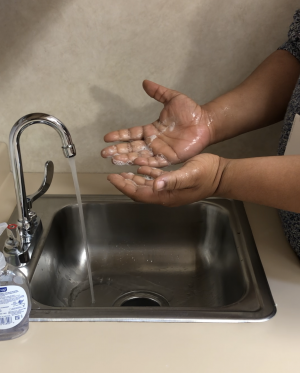The best defense against viruses may be in your hands
 Frequent handwashing, done properly, offers an effective prevention tool against viruses, especially when vaccines or medical treatments are not available.
Frequent handwashing, done properly, offers an effective prevention tool against viruses, especially when vaccines or medical treatments are not available.
Flu season is in full swing across America. The CDC’s weekly map of cases in the US shows widespread influenza in almost all states. To make this virus season worse, the outbreak of respiratory illness caused by the novel coronavirus (Covid-19) has reached the United States. CDC is closely monitoring the outbreak. At this time, there is no vaccine to protect against it and no medications approved to treat it. So, how can you protect yourself?
What are the very best ways of protecting yourself?
In the absence of vaccine and medications, frequent handwashing done properly offers a simple and effective prevention tool. Virus such as influenza and Covid-19 is transmitted through respiratory droplets, and can be transmitted through skin-to-skin contact (such as handshakes) or by touching an object that has the virus on it. Touching your face, mouth, nose or eyes can then lead to influenza infection. Alcohol-based hand sanitizers are good, but they are not quite as effective at decreasing virus transmission as a soap-and-water based handwashing.
How to best wash your hands?
It seems intuitive, but many of us need a refresher course in what is the best way to wash your hands! Most of us in the U.S. don’t wash our hands for a long enough duration to be truly effective: a recent handwashing survey found that most people wash their hands for just 5-10 seconds. And many of us could use some tips for coaching our children with handwashing techniques. Here’s how:
- Wet your hands with warm, running water.
- Apply a gentle soap.
- Rub your hands vigorously together to lather the soap.
- Scrub all of the skin surfaces, making sure to clean the back of the hands, between your fingers, your wrists, and under your nails.
- Rub for at least 20 seconds!
20 seconds may seem interminable when you are standing at the sink! Children can be encouraged to sing, “Happy Birthday To You” twice through as a good gauge of how long to wash. Adults can choose the song of their choice! Rinse your hands well with running water and dry your hands with a clean towel, paper towel, or air dry.
Don’t let a fear of hand dermatitis prevent you from handwashing often
Unfortunately, frequent hand washing can sometimes lead to hand dermatitis, especially in the cold, dry winter time. Hand dermatitis can often be avoided by careful use of hand creams immediately after washing. Place a tube of hand cream at each sink around your home to encourage household members to use it immediately after washing. Using heavier oil-based moisturizers at night under cotton gloves can also help heal severe irritation. If your hands still suffer from dry, red, scaly and fissured skin, your dermatologist at SkinCare Physicians can prescribe a topical steroid ointment to help soothe the inflammation. Don’t let a fear of hand dermatitis prevent you from washing your hands as often as you need to, to keep you and your family healthy—your health is in your hands!



I’m currently on Skyrizi for my psoriasis am I considered at risk and need to self isolate covid 19
While we cannot make specific recommendations regarding your specific care, it is an important question that we encourage you to discuss with your current psoriasis provider.